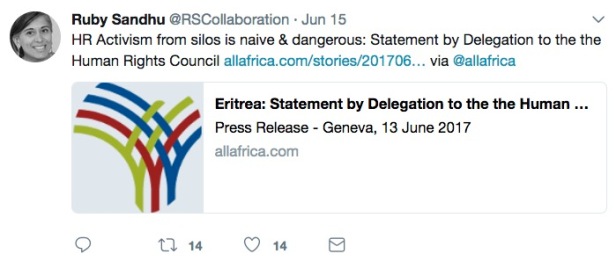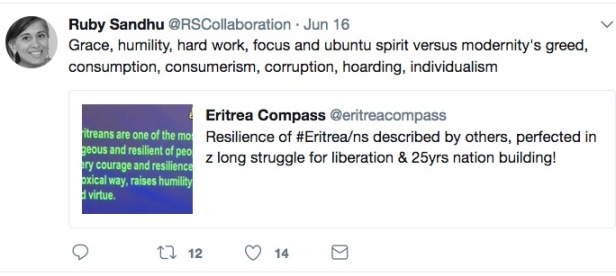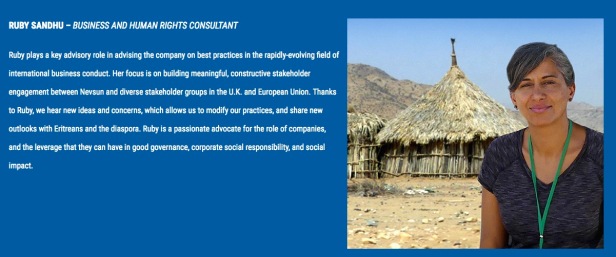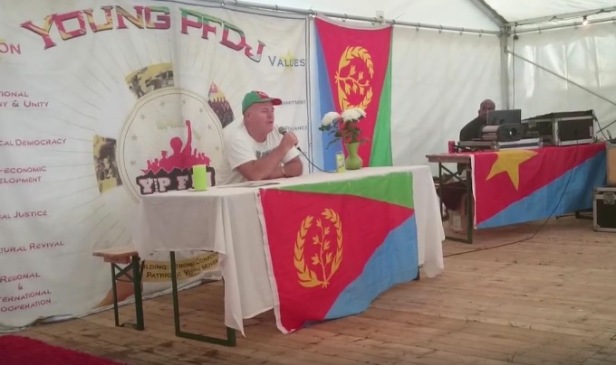by Leonard Vincent and Martin Plaut
Introduction
You might think that a regime that incarcerates and tortures its citizens – regularly; that holds its people in complete subjection – would be cold-shouldered.[1]
You might think that a government that is held by a United Nations Commission to have been guilty crimes against humanity would not really be attractive to foreign supporters.
You might think that a State without a constitution, independent judiciary or free press, and in which the only applicable law is the caprice of an unelected President, would be ostracised by people of good conscience around the world.
You might think that an administration that holds most of its citizens in perpetual servitude, under the guise of ‘National Service’, would be an international pariah.
And in the case of Eritrea you would, on the whole, be right. Of course some European governments, fed up with the flood of Eritrean refugees crossing the Mediterranean, are now seeking to achieve a ‘new engagement’ with President Isaias’s government to halt the exodus, even though there continues to be some resistance to this project in Brussels and certain European capitals.
The same cannot be said of a group of foreign individuals and institutions who have become what might be termed ‘friends of the Eritrean government.’ For a variety of reasons they have become its ‘cheerleaders’ abroad. They are, of course, not to be confused with friends of the Eritrean people (among whom are both authors of this article). These are supporters the government of President Isaias Afwerki, no matter how compelling the evidence of human rights violations in the nation over which he presides. This article will look briefly at these foreign ‘friends’.
Ruby Sandhu
Ruby Sandhu is a British lawyer, and a partner with the law firm, The Brooke Consultancy LLP.[2] Her website says she has: “…worked on corporate commercial law, high profile cases, involving abuse of due process, political prisoners and politically exposed persons requiring a multi-jurisdictional approach to complex issues. She combines this experience to focus on Business and Human Rights law from a systems and organisational perspective.”
Ms Sandhu highlights her ethical interests and concerns: “Ruby is a passionate animal rights advocate and practising ethical vegan. She enjoys solo outdoor trail running with her springer spaniel (Bono), cycling and yoga.”
No hint here that she would ever countenance advocacy work supportive of one of the world’s most repressive regimes. Yet her tweets tell a rather different story. Ms Sandhu has publicised Eritrean government press statements criticising the work of the Commission of Inquiry of the UN Human Rights Council.

Other tweets have praised the achievements of the country, with no reference to the appalling repression which its population suffers.

In public forums, Ruby Sandhu has gone out of her way to argue that Eritrea is misunderstood, and that critics of the regime are misguided. In a discussion at the Overseas Development Institute – Britain’s top development think-tank – she argued that it was necessary to adopt a new approach and to “engage in a manner that is constructive.”[3] What is required, she argued, is a “more holistic, engaged and innovative approach”. It was only fifty minutes into the discussion, after being challenged by Martin Plaut, that she revealed a key fact that had been omitted when she was introduced as a member of the panel: Ruby Sandhu is a consultant, paid by Nevsun Resources, which is mining in Eritrea. “I must disclose I am a consultant for Nevsun Resources Limited,” she told the meeting.
Ms Sandhu’s relationship with Nevsun can be found on the company’s website.

Here Ms Sandhu is described as playing “…a key advisory role in advising the company on best practices in the rapidly-evolving field of international business conduct.” She also liaises with “…diverse stakeholder groups in the U.K. and European Union.”
Nevsun is named in the UN Commission of Inquiry Report as having been implicated in the use of forced labour at its Bisha mine. “The Commission collected evidence that forced labour occurred in the context of the development and exploitation of the Bisha mine, 150 km west of Asmara, which to date is the only mine in operation in Eritrea.”[4] On 20 November 2014, three Eritreans filed a lawsuit against Nevsun in the Supreme Court of British Columbia, Canada, complaining that Nevsun had relied upon forced labour to develop the project. The case continues.
Ms Sandhu has intervened in a range of public forums, often explaining that the situation in Eritrea is more “complex” than its critics would suggest, and calling for an understanding of the problems it faces as a developing country. It is a position that is similar to that adopted by Eritrean government spokesmen when speaking to international audiences.
Bronwyn Bruton
Bronwyn Bruton, is deputy director of the Africa Center, which is run by the US think tank, the Atlantic Council, which is another beneficiary of Nevsun’s largess. After some prevarication, she confirmed to a US Congressional hearing that Nevsun Resources provided the Atlantic Council with $105,000 in the financial year 2015.[5]

Ms Bruton has appeared on panels organised by the youth wing of Eritrea’s ruling party, the YPFDJ, with Todd Romaine, Vice-President of Nevsun. Despite this, she told the Congressional hearing she had “no direct relationship with Nevsun.”
According to testimony before the Congressional hearing Ms Bruton has regularly appeared on such platforms.
At the same time Ms Bruton does not deny the human rights abuses practiced by the Eritrean government. When asked by Congressman Christopher Smith about this she was unequivocal.
“Mr. SMITH. Let me just ask you with regards to the human rights situation, the State Department’s Country Reports on Human Rights Practices is an indictment on a myriad of human rights abuses being committed. I mentioned the CPC designation based on religious persecution and Father Ghebre-Ab elaborated on just a number of people who are actually incarcerated for their faith and the Tier 3 designation by the U.S. Department of State’s TIP office, which painstakingly looks at child and sex trafficking, they’re among the worst in the world. Do you agree with that or disagree with that?
Ms. BRUTON. I do not disagree with that.”
That would appear to be clear enough. But Ms Bruton practices what was perhaps best be described by the philosopher Roland Barthes as ‘Operation Margarine’.[6] This requires first accepting that something is bad and clearly unacceptable, but then gradually qualifying this judgement, before finally suggesting that one’s initial belief was just prejudice (as in the comparison between margarine and butter, in the Barthes example.)
In Ms Bruton’s case this is clearly revealed in her article for the New York Times entitled: ‘It’s bad in Eritrea, but not that bad.’[7] Here she first accepts a number of shortcomings of the regime (no constitution, many dissidents detained and never heard of again, no opposition parties, etc.) She then goes on to attack the findings of the UN Commission of Inquiry, arguing that: “The Eritrean government deserves to be called out for these practices. But the criticism, to be credible and effective, must be scrupulously fair, and the commission’s report is not. It extrapolates from anecdotal examples — like instances of rape by military forces — to allege systemic abuses and blame them on state policy.”
In her opinion the 500 interviews conducted by the UN Commission,[8] can be dismissed as merely ‘anecdotal examples,’ despite the fact that they included first-hand accounts of the most egregious crimes, including rape, torture and enslavement. Ms Bruton admits that Eritrea has a poor record, only to then undermined the case against the regime. As a result, the situation in Eritrea is obfuscated.
Another example of this technique is the Eritrean government’s policy of ordering its border guards to shoot to kill anyone attempting to flee across its border illegally. The UN Commission of Inquiry detailed the policy and spoke to witnesses who had evidence that it was practiced.[9] Yet Ms Bruton dismissed this, saying: “The COIE’s claim that Eritrea maintains a “shoot to kill” policy on the border is an especially egregious example—I’ve never heard of any meaningful evidence that would support that claim, except perhaps in a few, highly militarized spaces along the border, where Eritrea is actively in conflict with its neighbors. But even there, the evidence seems thin.”[10]
It is extraordinary for a senior research analyst working for a major think-tank to claim that she had never heard of ‘any meaningful evidence’ to this effect. There is considerable evidence for Eritrea’s shoot to kill policy which is readily available, not least from reputable organisation like Human Rights Watch. As HRW stated in its 2015 report: “Since 2004, over 200,000 Eritreans have fled to remote border camps in eastern Sudan and Ethiopia, evading Eritrean border guards with shoot to kill orders against people leaving without permission.”[11]

The cumulative effect of these denials is to whitewash one of the worst human rights abusers in Africa. Francoise Christophe, a former political attaché at the French embassy in Eritrea, concluded after reviewing Ms Bruton’s work that, “…the Atlantic Council’s artful spin amounts to nothing less than revisionism.”[12]
Toni Locher
Toni Locher is a Swiss citizen, who founded SUKE – the Swiss Support Committee for Eritrea.[13] The organisation’s annual reports date back to 2008.[14] Dr Locher works with two other Swiss citizens, Hans-Ulrich Stauffer, a lawyer, who recently published a book called “Eritrea – the second glance”[15] and Pablo Loosli, who is married to an Eritrean citizen and is the chairwoman of the Eritrean cultural association of Bern.
Dr Locher is the honorary consul for Eritrea in Switzerland.[16] In this capacity he regularly supports the Eritrean government, although he denies that he is a lobbyist. Dr Locher says he is not paid for his work, but has rather won the trust of the Eritrean regime after years of dedicated commitment to the country.[17]

Photo: Die Weltwoche
Dr Locher, who is an obstetrician, says he began his involvement in Eritrean politics after being involved in far-left politics as a student in Switzerland.[18] He made links with the Eritrean liberation movement, the EPLF, and its aid wing the Eritrea Relief Association. When Eritrea became independent he founded the Swiss Support Committee for Eritrea to help develop the country. And – in his view – Eritrea has made great strides in its development. “I am not a politician, but a doctor and I see the development of the country and I say ‘yes,’ this country has a chance.’”
At the same time, he takes controversial stances on key questions. The system of indefinite National Service in Eritrea, is regarded as a form of slavery[19] by the UN Commission of Inquiry since it can continue for decades. Yet it is portrayed by Dr Locher in a rather different light. In a newspaper interview he appeared to regard it as a legitimate form of nation-building.[20] ‘“A large part of the civilian service is provided, for example, as teachers in the villages. This is, of course, hard, and it is not particularly appealing to young city dwellers,’ says Dr. Locher. The pay has been relatively modest, but he says it has recently been greatly increased. Other operations are being carried out in the ‘Land of a thousand dams,’ as Eritrea is also called. Or help the farmers at the harvest. While not denying that Eritrea is an autocratic state, Dr Locher’s position is that African states need time to develop democratic structures.”
Dr Locher organised a mission to take six Swiss Parliamentarians to Eritrea in February 2016.[21] The politicians returned, explaining to the media that most Eritreans arriving in Switzerland were economic migrants, rather than refugees.[22] They also called for a diplomatic dialogue with the Eritrean government, as a way of resolving the refugee issue.[23] Only one parliamentarian, Ms. Yvonne Fehri, who was part of this mission, refused to sign the motion, saying she had been unable to obtain sufficient insight into Eritrea’s detention policies or the role of its military.
Thomas Mountain
Thomas C. Mountain was born in Honolulu, Hawaii. He told a conference of Eritrea’s sole legal party in Stockholm in July 2006, that he was someone who always believed in the “armed struggle,” rather than democracy.[24] He says he has supported the Eritrean liberation movement since 1983 and in 2006 decided to move to Eritrea with his Eritrean wife, where he has remained ever since. Mr Mountain lives in Massawa, enjoying the fishing, and moving to Asmara when it becomes too hot. “It’s a good life for us,” he says, even though there are problems with water and electricity.

Mr Mountain describes himself as an independent journalist. He writes for Counterpunch – which he says is “the largest, most reliable left-wing website in the United States.” He says it publishes most of his articles, and certainly the website have carried a number by Mr Mountain.[25] Other left wing websites also take what he says, but he has had little success with more mainstream media.
It is not hard to see why this is the case. Some of his claims are simply incorrect. In October 2016, he claimed that Cuba and Eritrea have many similarities, and went on to make this claim. “Cuba is the only country in Latin America to come to power through armed struggle, just as Eritrea is the only country in Africa to come to power out of the barrel of a gun.”[26] Zimbabweans would find this difficult to credit; so would Angolans, Mozambiquans and Rwandans – to name but a few.
Mr Mountain suggested that Amnesty International and Human Rights Watch were paid by the US State Department to undermine the Eritrean government.[27] He also believes that the opposition by members of the Eritrean diaspora to a conference being held by the Eritrean ruling party in the Netherlands was evidence of the rise of fascism and racism.[28] “Their ‘crime’? Being Eritrean, that is supporting their country publicly in the midst of a racist and fascist fullisade [sic.] of attacks by right and left wing Europeans against any and all things Eritrean.”
Such views are unlikely to gain Mr Mountain much of a following outside of the far-left media, although he says he is sometimes approached by Russian Radio for contributions. His influence beyond Eritrea is limited.
Sihem Souid
In France, Sihem Souid also presents herself as a ‘friend of Eritrea’. Ms Souid, a former French policewomen, now describes herself as a ‘communication operative’, whose clients include Saudi Arabia.[29] In 2015 and 2016, she obtained Eritrean visas and interviews with Eritrean politicians for the French press, and has personally accompanied French journalists during their carefully monitored ‘tours’ of the country. After one such visit Ms Souid described Eritrea as “a land run by women” on her personal blog, hosted by the website of the renowned right-wing weekly Le Point.[30] She even served as a press attaché for the Eritrean embassy in Paris: her mobile phone was the contact number provided on the embassy’s letterhead when it organised a press conference to try to smear the author of a TV report critical of the Eritrean regime after it had been broadcast by the public channel France 2.
Conclusion
These ‘friends’ are not without influence. In their professional capacities, Ruby Sandhu (in the UK) and Bronwyn Bruton (in the USA) have received funding from Nevsun Resources, a company which clearly believes they need to, and can, polish their international image. Ms Bruton has given evidence to Congress, while Ms Sandhu has spoken in the British Parliament. Ms Bruton has been used by the media as a serious commentators. Toni Locher (although honorary consul for Eritrea), Sihem Souid and Thomas Mountain are more peripheral figures, and there is no evidence they were paid for their work.
There is growing interest by mining houses in Eritrea’s minerals and they may well wish to fund consultants and spokespeople to intervene to improve Eritrea’s image in the international community. In the era of mass communication, good business means, first of all, a good business climate. After years of isolation, international corporations are starting to return. The French oil giant Total has in fact inaugurated a brand-new refinery in the port of Massawa.
The European Union has become ‘re-engaged’ with the country once more and member states are encouraging some non-governmental organisations to follow their lead. Finnish Church Aid is already operational in Eritrea; others may follow. Finnish Church Aid held a meeting at the United Nations with the Eritrean government and UNDP in October 2016.[31] For the Eritrean government, isolated and shunned by large sections of the international community, this was manna from heaven.
Together these groups and individuals, who are supportive of the Eritrean regime, despite its notorious reputation, could gain influence. They form a subtle system designed to ‘bring back Eritrea from the cold’. It is therefore all the most surprising that corporate lobbyists can be presented as well-informed commentators of a distant country.
It is worth noting, however, that so far these lobbyists and activists have not gained sufficient weight to prevent the UN Human Rights Council from continuing to hold the Eritrean government to account. In June 2017, the Council condemned “…in the strongest terms the reported systematic, widespread and gross human rights violations that have been and are being committed by the Government of Eritrea in a climate of generalized impunity.” The Council also renewed the mandate of Sheila Keetharuth, the Special Rapporteur for Eritrea.[32]
The balance of forces within the international community still upholds the reports of the UN and the work of groups like Human Rights Watch and Amnesty International. But if Eritrea’s links with the Saudis grows; its ties with various mining companies develop, and the EU works with the regime to halt refugees from crossing the Mediterranean, these human rights concerns could carry less weight. Ethical considerations might finally be waved aside. Anyone dismissing this possibility need look no further than the case of Sudan and President Omar al-Bashir.
Source=https://martinplaut.wordpress.com/2017/06/26/who-are-eritreas-foreign-friends/













































